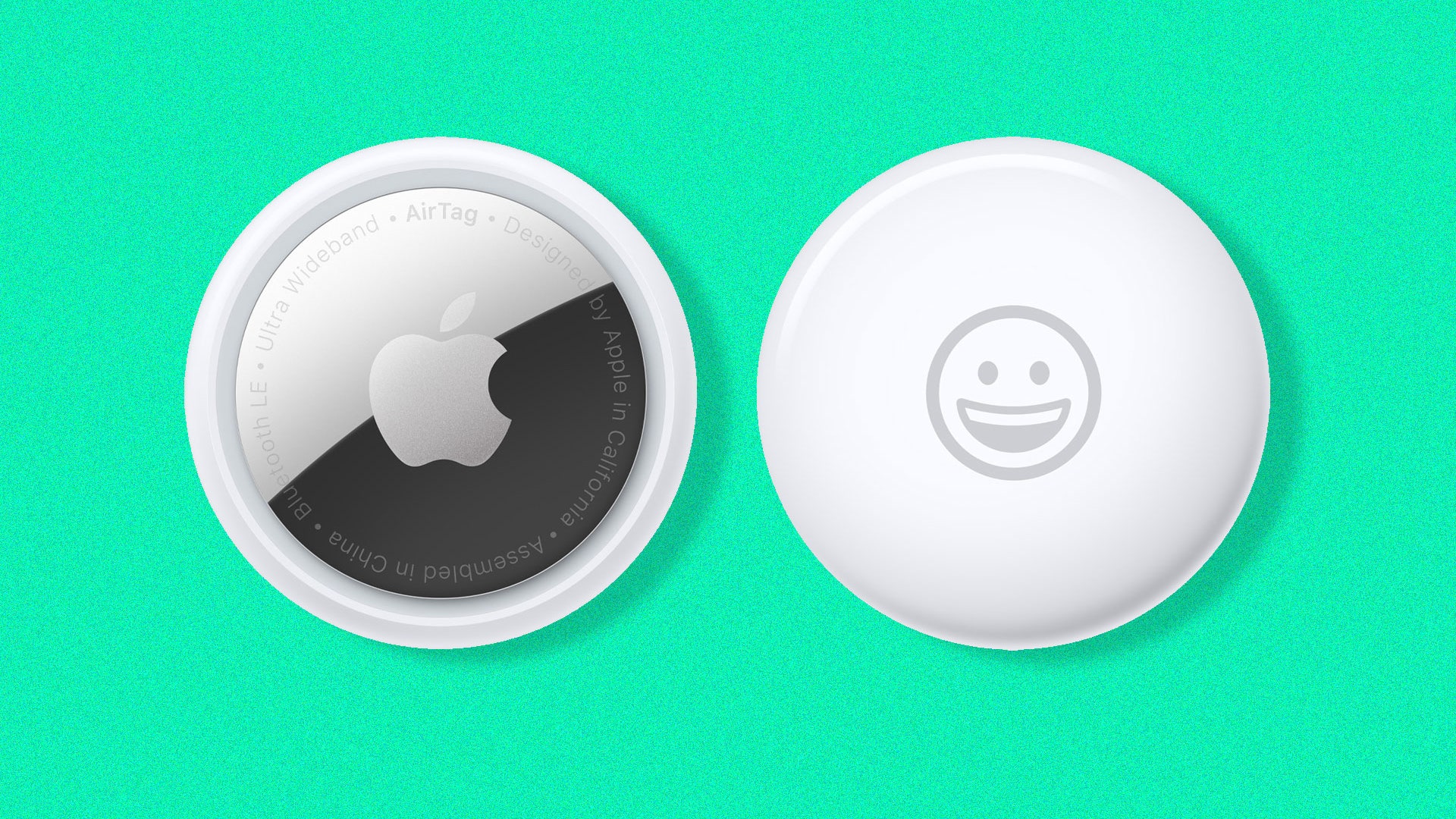When Apple has a new idea it is usually big with a capital “B”, such as transforming the iPod into a phone or screwing over Facebook with newly restrictive ad-tracking rules. When you’ve got a market cap of $2.25 trillion you don’t really need to waste your time on stuff that won’t trouble the bottom line. All of which makes AirTags a particularly charming curio, both in terms of their sheer existence and the considerable amount of thought that’s gone into them. They feel like that rare musicians’ side project that turns out to be something other than total vanity: more Gorillaz than Fat Les.
By now you’re probably wondering what in God’s name an AirTag is and whether you’ll need to remortgage your house to own the titanium model… Fear not, AirTags are tiny location trackers, with each being about the size of a Coca-Cola bottle cap. You can buy one for the really quite reasonable price of £29 or shell out £99 for a pack of four. They pair almost instantaneously with your iPhone in the same manner that a pair of AirPods do and then you can use them to check up on the whereabouts of almost anything you own.
We say “almost anything” here because Apple doesn’t recommend you use them with your pets – probably so they don’t treat the thing as a new chew toy and create a bunch of “Tim Cook killed my pooch” headlines in the process. Be honest, you would definitely read that story.
Find and seek
Once you’ve connected an AirTag to your iPhone you then need to attach it to an object. You can do so in a basic manner by dropping it into a bag, musical instrument case or whatever, or you can buy a “Loop” accessory (from £29, apple.com) to hold your AirTag in place with a bit more panache. Unfortunately, there’s no keyring-sized hole in these pucks, but they are at least water resistant should one find itself dropped in a puddle. You don’t have to put up with any proprietary nonsense if you want to replace an AirTag’s CR2032 battery either. These last for more than a year, can be replaced on your lonesome and can be bought in most corner stores. To which we say, “More of this sort of thing, please.”
Apple’s suggested use for AirTags in their ads is finding your keys down the side of the sofa, but that’s probably too low stakes for all but the hopelessly forgetful. Think more that you’ve left your rucksack with your laptop in it on the bus or maybe your car has taken an unexpected trip with an AirTag stowed away in its glovebox. Should disaster strike, the device’s U1 chip will use Bluetooth to connect to any Apple device in range and relay its location back to you via a map in the Find My app. The whole thing is so simple that it almost sounds too good to be true, but having gone on an AirTag scavenger hunt ourselves it works as well as you’d hope it to.
When you get particularly close to the proverbial jackpot, you’ll even get directional instructions in feet to make sure you don’t get lost at the finish line – so long as you have a more recent iPhone 11 or 12 to hand. No matter what iPhone you own you can also make an AirTag play a shrill, and honestly quite annoying, sound to further aid your chances of discovery. The major caveat for any attempted rescue mission is that an AirTag has to be close to an iPhone or another Apple device in order to ping its location, so these things will be easier to find in towns and cities than they will be halfway along a hiking trail.
Taking privacy seriously
Following GQ’s recent report on domestic abuse in lockdown and the frequent use of tracking devices among its perpetrators, we had initially been concerned about AirTags’ ability to be used for more nefarious purposes. Thankfully Apple has put in a good amount of work to undermine this: iPhone users will get an alert if someone else’s AirTag has been placed on or near them, while Android users will hear a noise if an AirTag hasn’t been paired with its source iPhone in three days. This is important stuff, so it’s reassuring to see Apple taking its responsibilities seriously here. It’s also another marker of the care that’s been put into a product that’s by far and away the most affordable product in its maker’s repertoire.
By extension, the location data of your AirTag devices is encrypted, so that no one but you can access it – not even Apple. Any other Apple devices that are used to find your AirTags can’t be identified in the process either. The whole network is anonymous, unless you want someone who finds a lost AirTag to be able access your contact information via their smartphone. Then you can turn that feature on via the Find My app’s “Lost Mode”.
Apple AirTags verdict
While AirTags by no means herald the next technological revolution, they are a little thing done exceptionally well. Proof, perhaps, that Apple still has the inclination to innovate “just because”, as well as the conviction in its privacy principles to make this kind of device without broadcasting your personal info for all the world to see. If you need a location tracker and are already signed up to the Apple-verse, then look no further. And if not? They’re here for when you might do. No big deal.
From £29.99. apple.com
Apple’s all-new iMac is a multicoloured powerhouse
Returnal probably isn't the PS5 exclusive you've been waiting for


